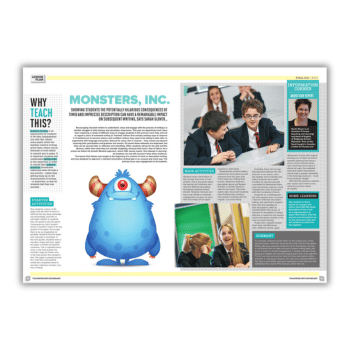Use this descriptive writing KS3 lesson idea to show students the potentially hilarious consequences of timid and imprecise description. It just might have a remarkable impact on subsequent writing…
Encouraging reluctant writers to understand, value and engage with the process of writing is a familiar struggle.
If students are to become mature and confident with their descriptive writing, they need to be willing to take risks, to experiment with language and syntax. And yet for some, this is a barrier – they cannot see beyond ensuring their punctuation and grammar are correct.
Of course these elements are important, but you can secure them later in reflection and redrafting.
In KS3 descriptive writing, students will often go for the safe and the obvious, rather than what they are actually imagining, because they have a fear of failure.
Starter activity
Give students a piece of A4 paper and ask them to fold it in half from the top down (vertically, not horizontally), and then in half again.
Explain to students they are going to play the game Consequences. Each student draws a monster’s head in the top quarter of his paper. Encourage them to be as imaginative as possible.
Students fold the paper over and pass it clockwise. In the next quarter, students draw a monster’s body and arms: again, they fold the paper and pass it clockwise.
Repeat this twice more. In the third quarter, draw the monster’s legs. In the final section draw the monster’s feet. Pass the paper around for a final time. Students can then unfold the completed sheet to see their collective monster. Cue lots of hilarity.
Students now need to write a description of the monster they have in front of them. Intervene here and elicit the different descriptive techniques students should include.
Sarah Glover is an Assistant Principal (teaching and learning) and Head of English at Ridgeway School, Plymouth.
- Browse more free KS3 English reading and writing lesson plans
- Take a look at our Year 8 English worksheets
- Browse KS3 creative writing resources for teaching plot and setting














